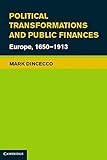Political transformations and public finances [Texte imprimé] : Europe, 1650-1913 / Mark Dincecco,..., Monographie imprimée
Language: anglais.Country: GrandeBretagne, EtatsUnis, Australie.Publication : Cambridge, New York, Melbourne [etc.] : Cambridge university press, cop. 2011Description: 1 vol. (XII-233 p.) : graph. ; 24 cmISBN: 978-0-521-19233-0; 0-521-19233-1.Series: Political economy of institutions and decisions seriesDewey: 336.409 03, 22 ; 336, 22Abstract: "How did today's rich states first establish modern fiscal systems? To answer this question, Political Transformations and Public Finances by Mark Dincecco examines the evolution of political regimes and public finances in Europe over the long term. The book argues that the emergence of efficient fiscal institutions was the result of two fundamental political transformations that resolved long-standing problems of fiscal fragmentation and absolutism. States gained tax force through fiscal centralization and restricted ruler power through parliamentary limits, which enabled them to gather large tax revenues and channel funds toward public services with positive economic benefits. Using a novel combination of descriptive, case study, and statistical methods, the book pursues this argument through a systematic investigation of a new panel database that spans eleven countries and four centuries. The book's findings are significant for our understanding of economic history, and have important consequences for current policy debates"--Provided by publisher; "How did today's rich states first establish modern fiscal systems? To answer this question, Political Transformations and Public Finances by Mark Dincecco examines the evolution of political regimes and public finances in Europe over the long term. The book argues that the emergence of efficient fiscal institutions was the result of two fundamental political transformations that resolved long-standing problems of fiscal fragmentation and absolutism. States gained tax force through fiscal centralization and restricted ruler power through parliamentary limits, which enabled them to gather large tax revenues and channel funds toward public services with positive economic benefits. Using a novel combination of descriptive, case study, and statistical methods, the book pursues this argument through a systematic investigation of a new panel database that spans eleven countries and four centuries. The book's findings are significant for our understanding of economic history, and have important consequences for current policy debates"--Provided by publisher.Bibliography: Bibliogr. p. 209-221. Notes bibliogr. Index.Subject - Topical Name: Finances publiques -- Europe Histoire | Impôt, Administration et procédure -- Europe Histoire | Décentralisation administrative -- Europe Histoire| Item type | Home library | Collection | Call number | Status | Date due | Barcode | Item holds |
|---|---|---|---|---|---|---|---|
| Prêt normal | BU Chevreul 2ème étage : Economie | Economie et gestion | 336.1 DIN (Browse shelf (Opens below)) | Available | 0379110045 |
Bibliogr. p. 209-221. Notes bibliogr. Index
"How did today's rich states first establish modern fiscal systems? To answer this question, Political Transformations and Public Finances by Mark Dincecco examines the evolution of political regimes and public finances in Europe over the long term. The book argues that the emergence of efficient fiscal institutions was the result of two fundamental political transformations that resolved long-standing problems of fiscal fragmentation and absolutism. States gained tax force through fiscal centralization and restricted ruler power through parliamentary limits, which enabled them to gather large tax revenues and channel funds toward public services with positive economic benefits. Using a novel combination of descriptive, case study, and statistical methods, the book pursues this argument through a systematic investigation of a new panel database that spans eleven countries and four centuries. The book's findings are significant for our understanding of economic history, and have important consequences for current policy debates"--Provided by publisher
"How did today's rich states first establish modern fiscal systems? To answer this question, Political Transformations and Public Finances by Mark Dincecco examines the evolution of political regimes and public finances in Europe over the long term. The book argues that the emergence of efficient fiscal institutions was the result of two fundamental political transformations that resolved long-standing problems of fiscal fragmentation and absolutism. States gained tax force through fiscal centralization and restricted ruler power through parliamentary limits, which enabled them to gather large tax revenues and channel funds toward public services with positive economic benefits. Using a novel combination of descriptive, case study, and statistical methods, the book pursues this argument through a systematic investigation of a new panel database that spans eleven countries and four centuries. The book's findings are significant for our understanding of economic history, and have important consequences for current policy debates"--Provided by publisher


